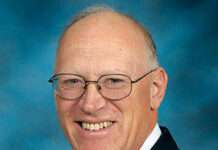Sunflower Foundation official outlines benefits of trails in Kansas
MANHATTAN, Kan. – Trails that promote walking, biking, running and other activities in Kansas communities are great opportunities to improve physical health, but a representative of the Kansas Sunflower Foundation said they’re also a great way to build community and economic health.
Elizabeth Burger, the senior program officer for the Sunflower Foundation, said evidence continues to grow that trails help to improve mental health, community pride and business opportunities.
“Trails are a public asset that residents – meaning your town’s taxpayers and voters – can enjoy every day,” said Burger, who spoke to nearly 100 participants during K-State Research and Extension’s monthly online series, First Friday e-Calls, which helps to nurture small businesses and inspire entrepreneurship in Kansas.
“But,” she added, “trails can also provide amazing, one-of-a-kind experiences to those that visit your town.”
Burger said the Sunflower Foundation, a health philanthropy that provides grants to eligible projects, has invested in developing trails in Kansas since 2005 as a way to support the built environment.
She noted that the foundation has helped more than 200 projects in 73 Kansas counties.
“We know that just telling people to move more is not very helpful if there’s no place to go,” Burger said. “Ensuring that towns of every size have safe, accessible places to walk, bike and roll continues to be an important public health strategy and – as we’ve learned – an important community-building strategy.”
In Kansas, some of the communities that have built or are planning to build trail systems linked to communities and businesses include Ottawa, Iola, Humboldt, Johnson County, Rooks County and numerous others.
Burger also cited successful trail projects in neighboring states, including Arkansas, Missouri and Nebraska that indicate the economic opportunities available to towns. The Katy Trail in Missouri, for example, attracts 400,000 visitors per year and provides a return on investment of $18 for every dollar invested.
“There’s a great paper published by Headwater Economics that breaks down the benefits of trails into language that’s probably familiar to most of us,” Burger said. “In terms of residents, we can’t underestimate what trails can do for property values. There’s also good data that supports t he idea that trails actually make communities safer, or at least the parts near the trail. In terms of visitors, there are direct, indirect and induced economic benefits.”
Recently near Ottawa, the community hosted the annual Prairie Spirit Trail Ultra Marathon, attracting 380 runners from 32 states – including Hawaii and Alaska. The race stretched from Ottawa to Iola and back.
The trail has become part of an even larger community effort to attract visitors who are interested in unique outdoor experiences. John Coen, the president of the Ottawa County Chamber of Commerce, and Wynndee Lee, liaison with the City of Ottawa’s office of community development, talked about their city’s effort to build Legacy Square right in the middle of downtown and two adjacent trails.
The project transformed a dusty, abandoned lot into a beautiful outdoor facility with green space, shelters and bathrooms that now attract visitors to evening movies and other community events.
Since building Legacy Square, several businesses have opened, including two coffee shops, a bike store, a brewery, four restaurants and a hotel.
“I think we are just getting to the point in Kansas where enough trail tourism is happening to think about ways to capture those data and quantify economic impact, such has been done in other parts of the country,” Burger said. “Right now we have a lot of anecdotes and good examples, but it’s a good start toward better understanding the value of trails in our communities.”
Burger’s full talk and other First Friday presentations are available online from K-State Research and Extension.
FOR PRINT PUBLICATIONS: Links used in this story
Sunflower Foundation, http://www.sunflowerfoundation.org
First Friday e-calls, www.ksre.k-state.edu/community/business/entrepreneurship
K State Research and Extension is a short name for the Kansas State University Agricultural Experiment Station and Cooperative Extension Service, a program designed to generate and distribute useful knowledge for the well being of Kansans. Supported by county, state, federal and private funds, the program has county extension offices, experiment fields, area extension offices and regional research centers statewide. Its headquarters is on the K State campus in Manhattan. For more information, visit www.ksre.ksu.edu. K-State Research and Extension is an equal opportunity provider and employer.
Story by:
Pat Melgares
785-532-1160
melgares@ksu.edu





